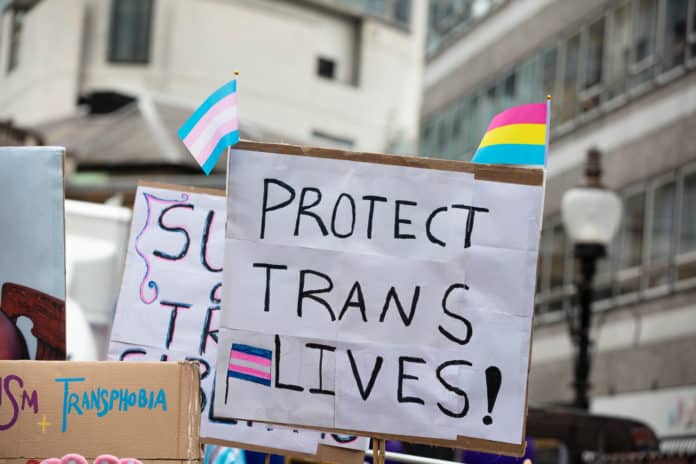Here’s a multiple choice question to ponder: The current outbreak of transgenderism is primarily the result of the impact of which of the following on our society.
- an ideology
- medical and educational experts
- social media
- a psychological condition
- all of the above
- none of the above
While it might be tempting to choose E, the most correct answer would be F — as in Fad. How else to best explain the recent surge in gender dysphoria among American youth? Since 2017, cases of this affliction among those between six and 17 have increased by over 170 percent.
How permanent will this sudden surge in cases prove to be? No one knows. But the longer this fad lasts, the more powerful the transgender movement will become. And the more powerful it becomes, the more consequential its impact will be.
The consequences will surely be obvious for the young who choose to have their bodies a) altered; b) mutilated; c) transformed; d) rearranged … (OK, enough of that!) with or without parental consent. But the impact will also be felt by families, churches, and entire communities, not to mention the country at large.
Think back to another fad that began to rear its seemingly enlightened head early in the last century. That would be the phenomenon that went by the scientific name of eugenics. Its goal was to reduce, if not eliminate, human suffering by (as Webster defines it) “selectively mating people with specifically desirable traits.” What could possibly be wrong with that? Many otherwise respectable American leaders, including President Theodore Roosevelt and Supreme Court Justice Oliver Wendell Holmes, saw nothing wrong with it.
But there were dissenters. One of the most noteworthy was English author G. K. Chesterton, whose objections to eugenics could also apply to transgenderism. Both, after all, are fads run wild. Witness our current president declaring “transgender equality” to be the “civil rights issue of our time.” Or the mainstreaming of “drag queen story time.” Or the sudden arrival of genderless “birthing people,” whose progeny are magically “assigned” a gender at birth. Or trans women winning swimming, if not swim suit, competitions. Or the cancelling of feminists who object to trans women competing against biological women.
To England’s great credit, Chesterton was never cancelled. And to his enduring credit, Chesterton never so much as flirted with eugenics. He laid out his full case against it in a 1922 book with this no-nonsense title: Eugenics and Other Evils, which traced the trajectory of eugenics from its initial status as an offshoot of Darwinian (“survival of the fittest”) thinking to its rising popularity as not just a fad, but a highly “fashionable” one at that.
While conceding that many fads prove to be brief and harmless, Chesterton predicted that this particular fad might well last long enough to become “dangerous” and, yes, even “tyrannous.” Dead by 1936, he would not be on hand to witness the lengths to which Nazi Germany went to implement its eugenics-inspired “final solution.” Nonetheless, he was certainly correct to suggest that the fad that was eugenics could — and would — become tyrannous.
Is transgenderism on a similar trajectory? The possibility seems absurd on the face of it. But is it? Itself an absurdity, it deserves the full Chestertonian treatment, namely the lampooning of it, coupled with an attack on it, before it becomes something much more than either a silly or a fashionable fad.
Chesterton understood that this would be no easy task. After all, leading the charge for eugenics were “intellectuals,” who were determined to better society on the basis of their “idealism and benevolence.” Adjectives such as idealistic, benevolent and, yes, scientifically-minded could also characterize the well-educated, or at least well-credentialed, elite of the transgender movement.
But breeding a superior race is idealistic? And sterilizing the “feeble-minded” is benevolent? As far as Chesterton was concerned, such actions were evidence of “the last anarchy of the industrial state.”
His key insight here was that acts of anarchy can be committed by the state, as well as against the state. Today it is transgenderism that has become the latest “anarchy of the industrial state” in action. Really now, what could be more anarchic than promoting and defending the denial of biological reality?
For that matter, anarchy could also characterize punitive state action against those who would oppose the transgender agenda. After all, if such opposition can be categorized as nothing more than irrational bigotry, and if open bigotry is nothing more than hate speech, and if hate speech is nothing less than criminal, and if crime is still punishable, what then follows? Both anarchy and tyranny.
The late Francis Cardinal George of Chicago once speculated that, while he likely would die in bed, his successor might possibly die in prison, and his successor could well be executed.
Will the currently fashionable fad of transgenderism produce tyrannous results in our not-all-that-distant future? Signs already abound. Those who object to genderless restrooms and the consequences therein are labeled “domestic terrorists.” Parents are denied information about their own children and then face punitive action if they choose to defy the state by asserting their authority over their underage offspring anyway.
Why not? Serious punishment must be meted out to those who would dare to stand against the civil rights cause of this — or any future — time.
The views and opinions expressed in this commentary are those of the author and do not represent an official position of Alpha News.











